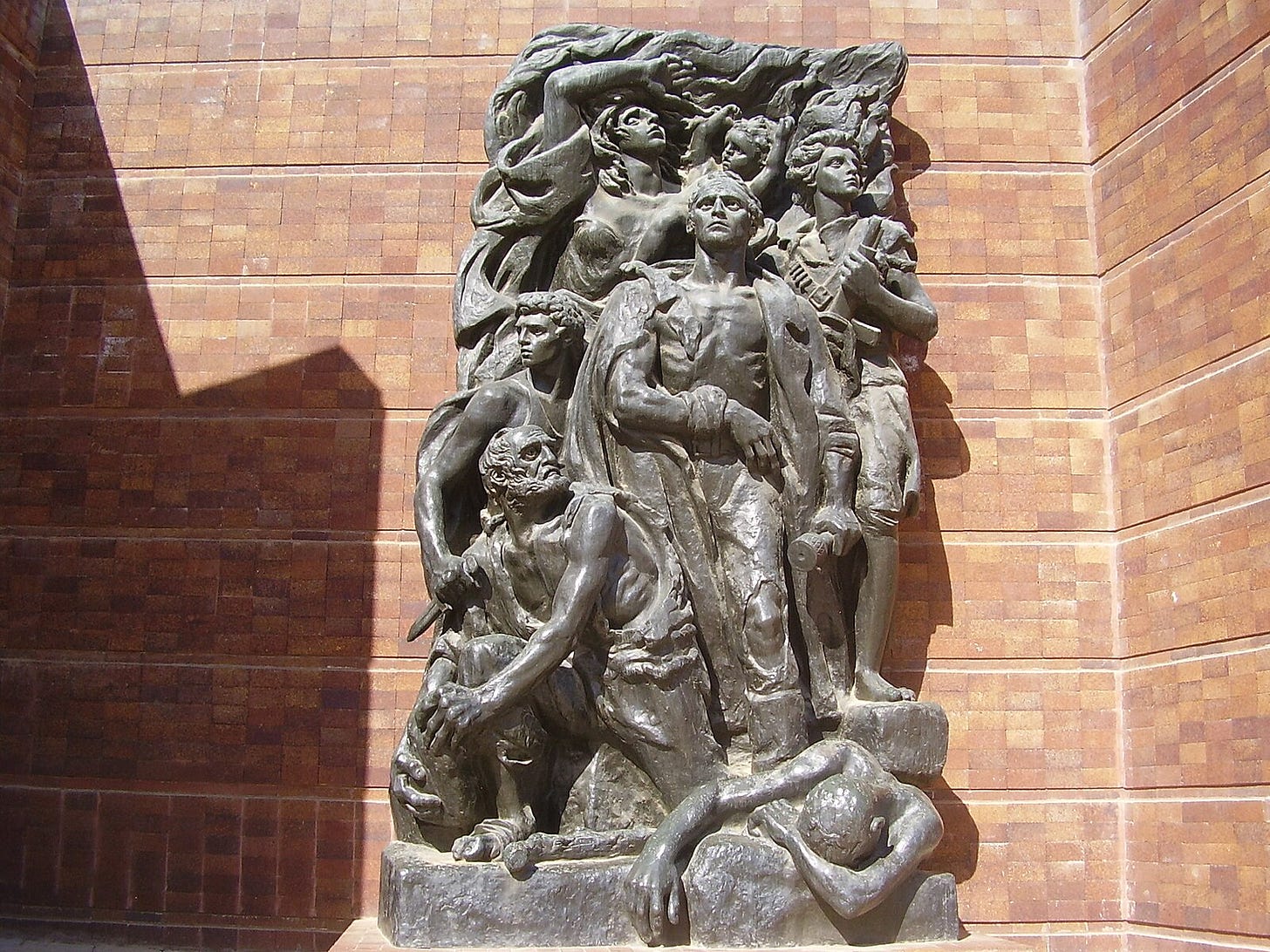Finding Meaning In "A Real Pain"
The two men are alienated in their own ways. But perhaps they’re also alienated from others by a shared family history, the legacy of losing relatives to the Holocaust and searching for its meaning."
By Debbie Weiss
For me, the movie A Real Pain felt like a rumination on loneliness. The film stars Jesse Eisenberg, who also wrote and directed, as “David” and Kieran Culkin as “Benji,” two Jewish American cousins from New York, one uptight and the other free-spirited, who go to Poland on a tour to visit the childhood home of their late grandmother, a Holocaust survivor.
From the beginning, we really see who these characters are. David repeatedly calls Benji from the taxi en route to the airport to stress over timing while Benji is already there, messy and vacant looking, as if he’s been there for hours, more aimless than organized. They grew up close to one another, but their relationship frayed over the years, each harboring resentments towards the other — possibly based on their different lifestyles.
The two join what’s called “a Holocaust tour” run by affable British tour guide “James” (Will Sharpe). There’s also worldly divorcee “Marcia” (Jennifer Grey), and Rwandan Jewish convert “Eloge” (Kurt Egyiawan), and an older couple “Mark” and “Diane” (Daniel Oreskes and Liza Sadovy), who mainly want to enjoy the tour.
The heart of the movie is the relationship between the two cousins as they struggle with their feelings toward each other. David, responsible for a job and family, tries to reconcile his love for Benji with Benji’s carefree but unfocused, erratic nature. Chafing against David’s reserved nature and lamenting their past closeness, Benji cries to him, “You used to feel things, man!”
David has a ”good job in internet sales,” and a wife and young child, but he doesn’t really connect with anyone on the tour. Benji says his grandmother was the only person who ever understood him. Yet he bonds with his fellow tour members despite his sometimes outrageous behavior and unfiltered remarks.
In one of my favorite scenes, Benji persuades the group to do a pantomime in front of the Warsaw Uprising Memorial. David declines, saying it’s in bad taste, only to be left juggling their phones as he photographs their attics, capturing the moment for each of them, but remaining outside the group. At the trip’s end, Benji says goodbye to them all with heartfelt, warmly reciprocated hugs while David says a cooler goodbye from a distance, never having meshed with them.
Both are dealing with their own individual pain. David, living with anxiety and taking medication for OCD, keeps his pain to himself. He feels things, he’s just taught himself to keep his feelings in check. Benji, with his outbursts, labile emotions, and brick of marijuana, is vibrating with unexpressed grief. Some reviews have suggested he might be bipolar.
There’s also the generational pain of the Holocaust which seems like a character in its own right. In an interview, Eisenberg, who lost ancestors in the Holocaust, said that he’s “always had trouble reconciling my own personal anxieties and misery with the horrors that my family experienced.” He has felt that he should overcome any personal unhappiness based upon his ancestors’ suffering.
Eisenberg also said he set his characters against the backdrop of something so horrific to ask whether smaller modern day grievances really are painful against such a backdrop. He concluded that individual pain is real, but wonders about its significance.
When I lost my husband in 2013, I remember thinking I should be grateful that my family and I were safe as opposed to living somewhere at war, but grief isn’t that mature. We hurt for those we’ve lost, and telling ourselves that others have it worse isn’t necessarily helpful. It’s like being told to eat food you hate because people elsewhere are starving: it still tastes yucky.
I was struck by the loneliness of the two characters. David’s reticence holds him back from connecting with his tour mates, but he returns to a nice home in Brooklyn and a loving wife and child, suggesting a rewarding personal life. Benji connects deeply with many on the tour but appears otherwise alone, both beginning and ending the movie sitting by himself at the airport with nowhere to go.
As someone reserved who sometimes feels awkward, I related more to David. I envied Benji’s ease with others and lack of self-consciousness. Imagine going through the world not worrying what anyone thinks. But ultimately I pitied him; in his early forties, alone and adrift with no real home.
The two men are alienated in their own ways. But perhaps they’re also alienated from others by a shared family history, the legacy of having lost relatives to the Holocaust and grappling with its meaning. Benji has an uncontrolled outburst about the luxury of the tour contrasted with the suffering of the Polish Jews. I wondered if that legacy makes some Jews feel apart in the world.
In 2018, I did a tour of Poland which included a visit to Auschwitz. Two older couples who lost relatives there recited prayers at the site, their recitation memorable in its intensity. I sat with them for the reading, but not having lost anyone that way, I remained apart from them, both then and throughout the tour. \
The movie doesn’t provide any concrete solutions. One reviewer aptly notes:
“As with the generational pain, so too this familial pain has no easy answer, no simple solution. Rather than a perfect catharsis, the film opts for the messiness of truth.”
Pain is, after all, an inherent part of the human condition.
When the two cousins finally reach their grandmother’s house, they place a stone on her doorstep only to have a neighbor demand its removal, claiming it’s a safety risk and destroying their gesture. Benji winds up back where he started, alone at the airport. David returns home and places the stone on his own entrance, perhaps symbolizing some value gained from the trip.
He is imperfect, and his interactions with Benji were unsettling and sometimes angry, but at least honest. The film reminds us that the best we can do in our lives is make an effort to show up and try to connect. In that way, we can hope to find some grain of meaning.
DEBBIE WEISS is a former lawyer, essayist, and the author of Available As Is: A Midlife Widow's Search for Love.
From unpacking history and politics to navigating the nuances of family and personal relationships to finding the human angle on sports and entertainment — plus our unsparing take on what’s happening in the Jewish world — the canvas at JEWDICIOUS is limitless! JOIN US!!




